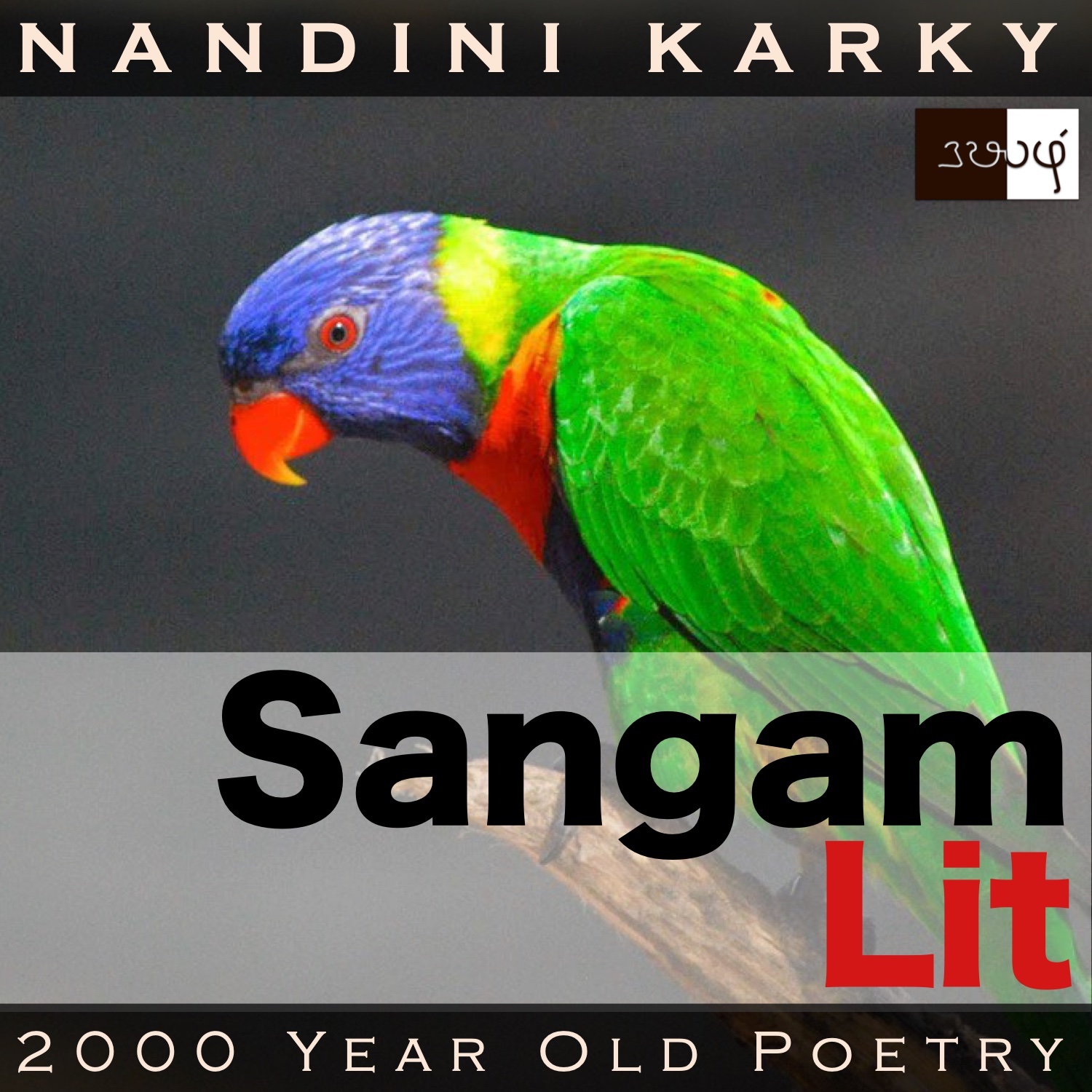Podcast: Play in new window | Download
Subscribe: Apple Podcasts | Spotify | Amazon Music | Android | iHeartRadio | TuneIn | RSS | More

In this episode, we perceive references to music and mythology, as depicted in Sangam literary work, Natrinai 304, penned by Maarokkathu Nappasalaiyaar, a female poet from the Sangam era. Situated in the mountains of ‘Kurinji’, the verse speaks in the voice of the lady to her confidante, expressing her angst as the man delays seeking her hand in marriage.
வாரல் மென் தினைப் புலர்வுக் குரல் மாந்தி,
சாரல் வரைய கிளைஉடன் குழீஇ,
வளி எறி வயிரின் கிளி விளி பயிற்றும்
நளி இருஞ் சிலம்பின் நல் மலை நாடன்
புணரின், புணருமார் எழிலே; பிரியின்,
மணி மிடை பொன்னின் மாமை சாய, என்
அணி நலம் சிதைக்குமார் பசலை; அதனால்,
அசுணம் கொல்பவர் கை போல், நன்றும்,
இன்பமும் துன்பமும் உடைத்தே,
தண் கமழ் நறுந் தார் விறலோன் மார்பே.
The verse opens with ‘வாரல் மென் தினை’ which means ‘long and soft millets’, instantly transporting us to a lush field in a mountain slope. Next, we hear the sounds of ‘வளி எறி வயிர்’ referring to ‘a wind instrument called vayir’. The instrument is said to have been used in battles and made of animal bone or the trunk of a tree. Another sound wafts to our ears in the rhythmic words ‘கிளி விளி’ meaning ‘a parrot’s call’. Ancient jewellers open shop with the words ‘மணி மிடை பொன்னின்’ meaning ‘gold amidst the sapphire gems’. The characteristic elements of a woman in love make an appearance with ‘மாமை’, ‘dusky beauty’ and ‘பசலை’, ‘pallor of pining. ‘அசுணம்’, the mythological creature that we encountered in Natrinai 244 is seen in this verse too. Ending with ‘விறலோன் மார்பே’ meaning ‘the chest of the strong man’, the song sends out a robust welcome!
The man and lady had been leading a love relationship and the man seemed intent only on trysting with the lady. He was delaying seeking her hand in marriage and the lady was suffering whenever he parted from her. Seeing her in angst, the confidante tries to console the lady, to which the lady replies, “After eating the freshly sprouted ears of the long and gentle millet crop, joining with its kith and kin in the rocks of the mountain slope, the parrot sends out a call, akin to that of wind through a ‘vayir’. Such is the cool and huge mountains of the good lord! When I am with him, my beauty blooms aplenty. When he parts, akin to gold amidst dark sapphires, my dusky beauty fades and the pallor of pining spreads, ruining my health! And so, akin to the hands of one who kills an ‘asunam’, both pleasure and pain arises in that cool and fragrant, garlanded chest of the strong one!” With these words, the lady expresses her angst at the man’s delay in seeking her hand and subtly persuades the confidante to speak on her behalf to the man.
Now, for the nuances! The lady starts by taking us to a spot in the mountains, where stands a millet field, filled with tall and full grown crops. As we are gazing at the beauty of food growing amidst these majestic mountains, a parrot comes there to raid this field. After hurriedly eating the crop, the parrot flies off to its kith and kin living amidst the mountain rocks and chatters with them, with the sound like that wind rushing through a ‘vayir’ instrument. The lady has taken us on this wildlife tour only to describe the land of the lord! After this description, she talks about how when the man is next to her, her beauty seems to grow manifold, but the moment he parts away, the pallor of pining spreads on her skin. She brings in an exquisite simile to describe this, saying the pallor spreads like the glint of gold between dark sapphires. From this, we understand that the ancients glorified the dark texture of their skin, shining like dark gems, whereas appearance of white or gold on the skin was not a sign of good health.
The lady then equates this dual state of happiness and suffering to that of a mythological creature. The ‘asunam’ is said to be a creature that was fascinated by pleasant music and one which would die the moment it hears harsh music. A figment of imagination or a creature of the past, one knows not! In this verse, the lady describes how ecstasy and misery comes to this creature from the same hands. These hands belong to the person who has set out to kill this creature! They would first send out the sweetest of music, perhaps by playing a lute so as to lure the ‘asunam’. The ‘asunam’ would come near them, pulled by the magnetism of this music and when it was close enough, the killer would play harsh sounds on a loud and rattling drum, making the creature fall dead, the very instant. The lady concludes by saying that like the hands of that killer, which gave such joy to the ‘asunam’ and subject it to a deep pain shortly thereafter, her lord’s chest too, gives bliss when near and agony, when far!
With the description of the lord’s mountain land, where the parrot, after feeding on millet crops, gets together with its kith and kin, the lady expresses a metaphor for how the man, after trysting with her, returns to his village, and hints at her wish that he should instead return to the lady’s village with them, making the music of marriage resound in their lives. With these subtle words, the lady is pressing on the confidante to persuade the man to formalise his union with her. With its dramatic similes, the poem also effects a deep understanding of the wisdom that happiness and sorrow are often two sides of the same coin!




Share your thoughts...